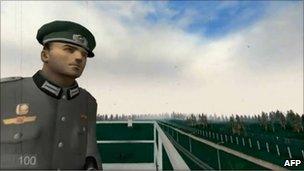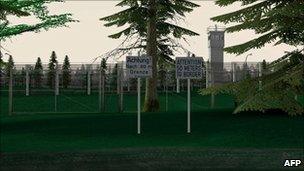German Cold War border guard game 1378 sparks controversy
- Published

The border between East and West Germany was heavily fortified and guards used deadly force
A computer game set in the Cold War which allows people to play as East German border guards who shoot political fugitives has caused controversy in Germany.
The game 1378 awards medals to "guards" if they shoot a high number of East Germans trying to escape to the West.
23-year-old Jens Stober created the game as part of his university degree.
Its release has been postponed from this Sunday, the 20th anniversary of German reunification, to a later date.
The title 1378 represents the length in kilometres of the border between East and West Germany during the Cold War, known as the "death strip".
The game has been developed in the first-person shooter genre where the player's perspective is that of the person holding the gun.
Up to 16 people can play at the same time and players can also take on the role of East Germans trying to flee the communist state.
"Guards", meanwhile, also have to face the consequences: they later find themselves in the year 2000, when they are put on trial for the shootings.
Mr Stober, a student at the University of Design, Media and Arts in Karlsruhe, says the game is an educational tool.
"Becoming an East German escapee or border guard enables players to identify with these figures," he said. "It's a novel way of encouraging young people to take an interest in coming to terms with recent German history."
Thousands of people tried to flee Communist East Germany into the West during the Cold War.
By conservative estimates, 136 people were killed trying to cross the Berlin Wall and, although there are no official figures, analysts say at least as many again were killed on the rest of the national border.
East German Rainer Wagner, who was arrested while trying to cross the wall - and spent two years in prison as a result - is among those offended by the game.

The game is set in 1976 when border fortifications had been upgraded
Now chairman of the Association for Victims of Communist Tyranny, Mr Wagner says 1378 is worse than other first-person shooters because normally in such games, one shoots at armed enemies.
"Here, it is unarmed civilians," he said.
Politicians from several German parties have also voiced their criticism of the game.
Mr Stober's university says it regrets the offence caused to the victims and families who suffered in the "death strip". However, it says it will offer every necessary support to Mr Stober.
The university has not announced a new date for the launch, but it now plans to hold a debate about the game at the same time.
- Published1 October 2010